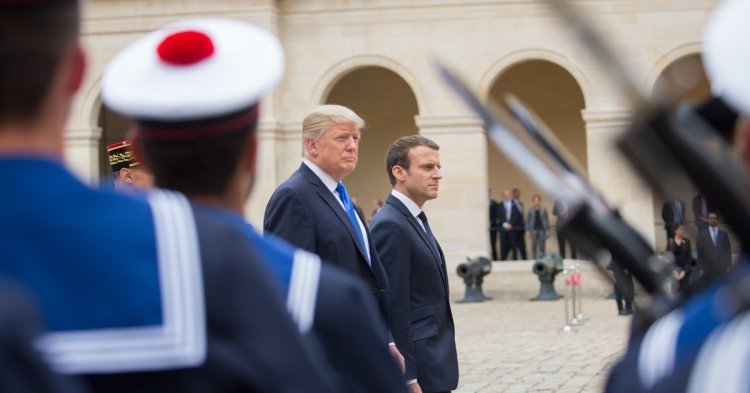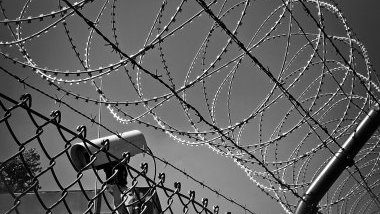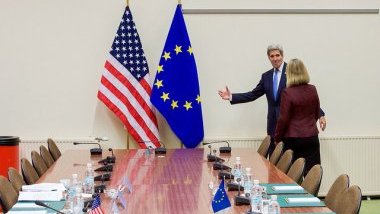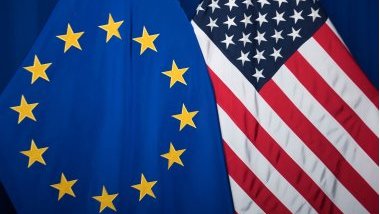What is certain is that the ‘bromance’ once displayed between Donald Trump and Emmanuel Macron is in a bad state. Kiss goodbye to the warm embraces and dinners at the Eiffel Tower, and make way for the barbs! On 29 November 2018 for example, before the Buenos Aires G20 Summit, Macron told the Argentinian newspaper La Nación that “it is true that the United States has taken some recent decisions against the interests of its allies”. He then recalled that “it is in these times of crisis that it is necessary to defend our common values”.
This statement complied with the French president’s vision of transatlantic relations, and of international relations in general. A few days after the ceremonies of 11 November in Paris, Trump fired out some spiced up tweets about ‘Emmanuel’, and the project of a European army.
Behind these ‘kind’ exchanges, eventually quickly forgotten, hides a deeper malaise: the questioning of multilateralism, the basis of transatlantic relations since 1945. Donald Trump is striving to fight the conception according to which international relations should be conducted in a multilateral framework. Very wary of international organisations, Trump favours bilateral summits and prefers meeting his counterparts face to face, in a more personal way. He is an unpredictable president, and he has actually made it his trademark. This is how he withdrew from the Paris Agreement on Climate and from the Iran nuclear deal. These unilateral decisions pushed the United States’ partners around, who quickly understood that they would have to square with the unpredictable behaviour of the new president.
Nonetheless, the depth of this rupture has to be nuanced. Indeed, since the start of their working relationship, Emmanuel Macron and Donald Trump have shown a cordial or even friendly relation, and this despite Macron’s failure to dissuade Trump from withdrawing from the abovementioned agreements.
The relation between France and the United States is today at the centre of transatlantic relations, whereas Barack Obama maintained a strong relationship with Germany and Angela Merkel. On a certain number of subjects, transatlantic tensions are not new. Some are even recurrent, such as the question of “sharing the burden” within NATO and the question of who should pay for Europe’s defence. Others are more recent: in the end, Barack Obama and Donald Trump only have a limited interest for Europe. On security matters, the two American presidents displayed a willingness to disengage from the Middle East. However, Trump’s diplomatic style is absolutely unprecedented, and reinforces the echo triggered by his sweeping decisions and declarations.
From Obama to Trump, a form of continuity
After two mandates of George W. Bush, which were of mixed results in terms of transatlantic relations, and in the context of Iraqi fiasco, the election of Barack Obama was welcomed in Europe as a real breath of air. In 2008, while he was campaigning for his first mandate, Obama delivered a founding speech in Berlin. His ‘rockstar’ show attracted tens of thousands of young Germans. He also evoked the American commitment for Europe, recalled the fall of the Berlin Wall and the airlift, among other things.
Obama also defended multilateralism, which in his view is a necessary framework for allies to listen to and trust each other. He received the Nobel Peace Prize after his election, although not without criticisms. With such big expectations around his presidency, it was difficult to imagine that he wouldn’t disappoint the Europeans at some point or another. It actually happened, quite quickly. However, it is paramount to notice that this disappointment happened on both sides.
While Europeans were disappointed with the American disinterest toward Europe as a strategic arena, Obama promptly became disillusioned by Europeans’ lack of military investment. While the United States asked NATO members for more troops in Afghanistan, their answer was very limited. Obama was also dismayed by the management of the Libyan crisis, expecting a greater European investment. Transatlantic relations under Barack Obama’s presidency thus had a bittersweet taste. His defence of multilateralism and dialogue, as well as his eloquence towards Europe, was compensated by inter-allied lack of understanding, and by a strategic disinterest towards the European arena.
As for Trump, it is simple: Europe has nothing to expect. In a 2016 campaign speech in which he evoked his vision of foreign policy, he quoted Europe only once – on the topic of sharing the burden. One can really find some things in common between Barack Obama and Donald Trump on security matters. First, regarding “America first”: these words, pronounced by Donald Trump, have a strong nationalist undertone. But this American preference also reveals a declared will not to engage too much internationally, as the recent and sudden decision to withdraw the American troops from Syria demonstrates. Obama had also announced his intention to remove the troops from Iraq in 2011, and was highly criticised for that.
Obama came to power holding with him the trauma of the Iraqi disaster. Trump is just as reticent to engage, despite a warmongering discourse. The difference being that it was less evident, in 2011, to figure out the flaws of the Iraqi system which would lead to the appearance of the Islamic State after the withdrawal of the American troops. Either way, these two decisions surprised the Western allies of the United States, who in particular pointed out the space these withdrawals left to Russia. Jim Mattis, military and ex Defence Minister of Trump, resigned after Trump’s withdrawal announcement.
Concerning NATO, the criticisms on the lack of European commitment and investment are not new, but they are more violent. Trump as Obama have both displayed their disinterest towards Europe. There has thus been a certain continuity in transatlantic relations since Trump’s election, and the depth of the rupture should be partly nuance.
Trump’s era, or the reign of unpredictability
Now that the nuance has been made, it is still important to underline that the similarities between Trump and Obama quickly have their limits. On values and liberal democracy for example, the two presidents have nothing to do with each other. According to a FBI report, racist and antisemitic crimes skyrocketed during the first year of Trump’s presidency. It would be hard not to correlate this data with the resurgence of racist speech, especially fed by the ultranationalist Steve Bannon, who worked on Trump’s campaign and used to be an advisor at the White House.
Regarding the economy, the differences are, once again, numerous. While Barack Obama addressed the European Union as an essential trade partner, Donald Trump sees it as a rival, and directly puts the institutions of international trade into question.
Trump’s last diplomatic attack against Europe is a major one: this January, the diplomatic mission of the European Union was downgraded to the status of a mere international organisation. Until then, the EU’s diplomatic status was the one of a full-fledged State, but it is now “at the end of the list”. This decision, unilaterally taken and without informing European diplomats, is incomprehensible for the Europeans. This goes against any diplomatic common sense, and is perceived as a humiliation. The Delegation of the European Parliament in the United States addressed a letter to the Congress, denouncing an ’increasingly harmful approach from the White House when it comes to transatlantic relations’.
The Europeans are also concerned by the resignation of James Mattis, perceived as one of the last “adults in the room” in the presidential administration. As the European Council on Foreign Relations writes:
“For Berlin, the recent departure of James Mattis (…) undermined the White House’s capacity to understand Europe. The US military’s experience in cooperating with allies across the Atlantic – in both the defence of NATO territory and joint out of area operations – will now have less influence on the Trump administration’s policy and decision-making than it once did. (…) With Mattis gone, it has become far more difficult to engage in damage control in transatlantic relations.”
This notion of “damage control” is central in Europe’s discourse, especially that of Berlin, regarding current transatlantic relations. While Donald Trump gets along relatively well with Emmanuel Macron, his relationship with Angela Merkel is very cold. Germany decided to adopt a sort of “wait and see” position. Trump also shows little interest in Theresa May.
It is obvious that Donald Trump’s style of communication, consisting of improvised and explosive tweets, is unprecedented, and has the potential to cause significant damage. To what extent will he be able to push it without durably harming transatlantic relations? This strategy of real-time (non)diplomacy has two consequences, which makes his advisors and allies freak out.
First, the tolerance threshold to the “scandals” caused by Trump’s tweets is higher and higher. This kind of behaviour, from any other head of state before Trump, would have caused a real outcry. But Trump campaigned like this, so this behaviour is simply the logical consequence. This style even catches on, as we can see with Bolsonaro’s success in Brazil and Duterte’s in the Philippines. The tolerance threshold being higher, this form of communication is beginning to become the norm, and reactions are less strong.
The second consequence is that it drives us to think about the performativity of Trump’s speech. This is relatively complicated to assess, precisely because of the outrageous aspect of some statements. By contrast, some decisions are quite moderated. This is for instance the case on the gap between his speech about NATO and the facts. And despite everything, the American president does not have unlimited power. In any case, it is clear that words, even if their effects sometimes have to be nuanced, have a meaning and play an important role in the deterioration of transatlantic relations. The big challenge for Western chancelleries is now to learn how to manage this new and unconventional way of communication, for both not adding fuel to the fire and being respected as allies. The difficulty for European diplomats is to square with Trump’s fiery words and acts, while at the same time remaining attentive to the unpredictability part of his foreign policy.
It is still too early to assess the long-term impact that Trump’s presidency will have on transatlantic relations, but in the short term, the difference with Obama’s presidential terms is obvious. Donald Trump’s inconsistencies, his rejection of multilateralism – basis of transatlantic relations – and an unpredictable foreign policy reinforce this fracture. As Ian Bond underlines it, “physically, the Atlantic Ocean is getting wider by about 20 cm a year. Politically, Europe and America risk splitting apart much more quickly.” All is not lost, but nothing is won.






Follow the comments: |
|
